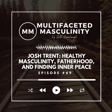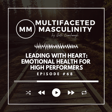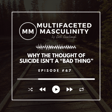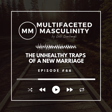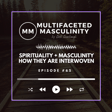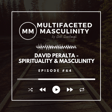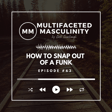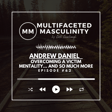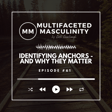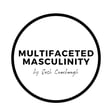Become a Creator today!Start creating today - Share your story with the world!
Start for free
00:00:00
00:00:01

Fu*k Your Ego.... or Maybe Not?? | Ep#49
“Death of ego” is a common thing you hear in plant medicine circles. The question is, is the ego ALL bad? Today we dive into that very question.
In this episode you'll learn:
- What is “the ego”?
- What is “Ego death”?
- How prevalent is it in our society?
- Where does it show up?
- How can it negatively impact your life?
- Can it serve you in a good way?
Host Name: Josh Cearbaugh
https://www.instagram.com/jcearbaugh/
https://facebook.com/joshcearbaugh
https://www.jumpstartyourlife.com
LinksHost Name: Seth Conner
https://www.instagram.com/sethaconner/
https://www.facebook.com/iSethConner/
https://www.linkedin.com/in/sethaconner/
Companies, Products & Places Mentioned
Ego is the Enemy
What is “The Ego”
https://www.successconsciousness.com/blog/spirituality/what-is-the-ego/
Transcript
Exploring Multifaceted Masculinity
00:00:00
Speaker
Men, we are not simple, chest-thumping, rock-smashing, fire-starting barbarians. We have depth. We intensely feel. We are scared, yet brave. We love to have fun. We're imperfect and make mistakes. We're compassionate and loving. We are multifaceted. Let's explore the reality of masculinity together.
Understanding Ego: Strength or Flaw?
00:00:28
Speaker
All right, today we are talking about a topic that quite honestly, I don't feel like is super clear. A lot of people are mentioning it and it's semi-trendy, but I haven't heard too many conversations that really delve into
00:00:46
Speaker
one what exactly is into how we can both be a potential pro but also a massive con and that is. Ego are egos and you know we all have an ego and what is that look like and how does that work in our life and can it be something that's beneficial and it's gonna be an interesting conversation because. Aspects just in conversation with seth.
00:01:13
Speaker
I don't know that we fully agree with one another in this area. And so we're not exactly sure where this conversation is gonna land but at least i think it's important. Like i said before about this podcast is really to provoke conversation amongst each other seven i but also.
00:01:31
Speaker
amongst you and yourself and your friends to have conversations around what is healthy masculinity and i think understanding ego both the pros and potential cons or the potential pros and the cons is an important thing to dive into so i guess to start it off with seth for you how do you see ego or what is ego for you i guess for me
Ego and Self-Identity
00:01:58
Speaker
Ego is or traditionally at least my understanding of ego is something attached to being egotistical Right. At least that's where how we've kind of heard it in the past is don't be egotistical Especially as a man men, I think have a are more susceptible to being egotistical. Maybe it's that masculine energy But it's always been a negative thing
00:02:19
Speaker
And my understanding of egotistical is just to have this in large sense of self-importance. You'll see people that self-promote themselves all the time, which is not a bad thing. But when it's chronic, like, look at me, look at me, look at me, then you could tell that there's a little something off. And
00:02:43
Speaker
I don't know if you remember, well, you do remember, but I'll recall is that there was a leader in our church men's group a while back when you and I first met years ago. And I always noticed that he would self-promote from the stage, right? And I was like, what?
00:03:02
Speaker
what's with this guy, you know? I didn't want to judge, but at the same time, I was definitely judging. But there was, it's just this enlarged sense of self-importance and needing to feel important, needing to feel significant. And again, at the core of those things are not necessarily bad, but when they come out in a way that's just...
00:03:22
Speaker
kind of self-centered is probably a better word for it. But I don't want to dig too much into it. I just think that that is kind of where we get this negative connotation with ego.
Modern Views on Ego
00:03:34
Speaker
And as we kind of dive into, when we get away from the church and we kind of look at different things and kind of the progressive kind of movements, there's always this thing about killing the ego.
00:03:46
Speaker
kill that ego, be humble. And the ego is the enemy kind of thing. So that's just kind of where it's been after me the last few years, but probably more recently in the last year or so, my thoughts on that have changed a little bit, which I know we will discuss and not argue about.
00:04:07
Speaker
Yeah, I don't disagree with anything that you just said. I think that for me, just with working with people, what I have found is ego, in addition to what you said, a lot of times it's what we as men use to create a false sense of safety or security. And what I mean by that is
00:04:30
Speaker
It when it's when i say that it's false it's because. We're using something it isn't authentically us because yeah the struggle or the challenges how do we embrace our strength as men. But not need the ego to be intact to embrace that strength.
00:04:49
Speaker
And, and so I think when you have to, you know, self promote and prop yourself up, you're, you're essentially, you know, it's like you're doing a Tony Robbins, stand on the chair, jump up and down, hype yourself up. And you're living from that place.
00:05:05
Speaker
That's not authentic, that's not authentically you. Doesn't mean that you can't be high energy or confident in who you are, etc. But when you have that false sense of safety, I think people more and more, their bullshit detector is getting better and has to because of everything that we're being shoved down our throats.
00:05:26
Speaker
You can you can just like you said something is off you can smell it or sniff it out where the energy that they're carrying isn't authentically them and so you know I know there's a lot of conversation around the masks that we wear and so if you're in social settings and you know a lot of times I always throw I love throwing guys for a curveball and say you know I meet you at a party and I go oh well who is Seth and
Ego, Career, and Authenticity
00:05:52
Speaker
one hundred percent of the time i've never had someone not answer that question with what they do. Right oh well i'm blah blah blah blah blah blah i'm like no no no no but who are you because for a lot of us are egos wrapped up in our career.
00:06:08
Speaker
And then it's like what happens if your career falls apart or if you know you get a demotion or get fired or whatever if your egos attached to that. That all of a sudden your sense of self worth and identity begins to crumble at its core.
00:06:24
Speaker
And really it boils down to like this need, when you're pumping yourself up and filling yourself with this ego driver, then you need those external validations. You need the social media likes or comments, or you need to keep promoting yourself to stay propped up in that. And to me, that's where I see ego getting in the way for a lot of guys.
00:06:50
Speaker
But again, I'm not saying that I have the answer for it. I don't know as something that I currently wrestle with is how do I embrace my strength? How do I embrace my inner king? How do I embrace my inner badass? Which all of that is good and masculine strength. But at the same time, let go of my ego. I don't like the word kill my ego because then it's like something that you're at war with.
00:07:16
Speaker
Right. How do I, how do I let that go? Like, how do I not need that to validate who I am? Yeah, that's a good question. And it sounds like you're kind of steering the ship towards, or at least what you're describing, um, when we talk about, you know, public facing people is, you know, these, uh, these coaches nowadays, you know, there's like, Oh, sorry. Yeah.
Ego in Self-Help and Marketing
00:07:41
Speaker
You know, it's these coaches that want to help other people become better, but it's like, look at me, look at me, I have all the answers, right? It's the, let me prop myself up so that, and essentially it's just like sales, like they're selling, they're trying to sell themselves. And I think maybe there is an aspect needed for good sales.
00:08:02
Speaker
to have that ego but like you like you have mentioned off off the air is that it's something that kind of you it drives us crazy yeah it's the cheesy car salesman feel exactly exactly and i know that that's something that you've kind of been um drawing my attention to lately is these these coaches that that have this ego i want to hear from you what it is that you've been seeing and how that's
00:08:29
Speaker
And let's just kind of pick that apart a little bit. Like, let's analyze this ideal egotistical life coach that we're seeing a lot of nowadays. I don't even know where to begin with that. I just because.
00:08:44
Speaker
I'm personally turned off, but also we have a digital marketing agency. So I'm neck deep on the things that, you know, the levers that you can pull to create sales or to generate revenue. And so I'm probably more sensitive than the average person to the over marketing or the aggressive marketing side of things.
00:09:05
Speaker
I'm just from you know general I talk to other people and when I hear them say oh well you know I bought this for this reason that it is like you do you realize you just took that hook line and sinker.
00:09:19
Speaker
And so, but specifically for men's coaches, there has, in my opinion, been a rise of men who, you know, it's normally, they are enlightened or they are, you know, they've gone on this journey and now they have found all of the answers and- The secret sauce. The secret sauce, you know, and all you gotta do is buy the secret sauce for them for $222 or $999. It's always three numbers in a row, right?
00:09:48
Speaker
And and again i don't like i have an online course a jump start your life dot com and i have coaching i do coaching so i'm not saying that there's not value in any of that or that egos exclusively wrapped up in it. But it's you know it's the it's the coach that.
00:10:07
Speaker
Share something on social media like a snippet and then somebody else shares it and then they re share the other person sharing their snippet.
Genuine Social Proof vs. Self-Promotion
00:10:18
Speaker
Yeah just to be able to go look so and so shared this and so and so shared this and. And that's that's that kind of like overly aggressive I need to promote myself I need to validate myself by saying look over here all these people are talking about what I'm saying or agree with my points and.
00:10:37
Speaker
I think that's when you, to me, that's the turn off, right? Is being willing to put stuff out there important? Yes, especially if you're a coach to help people understand their inner world. Obviously, we have a podcast that you're listening to and I have a blog, I have all the things, but
00:10:58
Speaker
Because my ego's not attached to that, I don't feel the need to aggressively promote and essentially sell myself for my own validation that, yep, you know what? I am a men's coach. I am a psychedelic integration coach. I do have the answers. And if you have this experience, come to me because I'm gonna change your life for the better.
00:11:18
Speaker
Would working with me potentially change your life for the better i would hope so and i have feedback from clients that. That validate that but i'm not needing to you know take a screenshot of somebody's email to me saying so you know we've been working for the last three months and i've completely changed my relational dynamic both myself and with others.
00:11:42
Speaker
I don't have to grab that and share that with everybody to go see told you that this is me. Look over here. Look at me. Look at me now sign up for my course.
00:11:52
Speaker
And let me make a delineation because on one hand, I don't think that that's necessarily a bad thing. It's just providing social proof to people that might not be, I don't want to say they're lazy, but they might not be as proactive to go grab that social proof, to feel like they're making a smart decision by working with you or anybody else. Social proof is good, but I am tempted at times to share the story that somebody just shared of mine. That temptation is there because I want
00:12:22
Speaker
To let people know like hey see the people are sharing my stuff there's validity to it but you make a good point is that. Are our ego does need to be validated it feels the need to be validated by these external these external sources.
00:12:41
Speaker
And I think that that just, you know, we see, we hear the term guru. We see these coaches out there that are pretty much saying, I've, like we said, Oh, we've got the special sauce. I have all the answers. I've gone down this path down the journey. And now I've got this 12 step process that is going to change your life. Now, maybe they do, maybe they have, I think anybody that tries to set themselves up like that majority of them, there are some frauds out there still, but
00:13:10
Speaker
People do have a life process they go through. They feel like they can offer something to the world. And I think it's true. I think anybody can go to a coach and get nuggets out of what they have that can be applied to their life that could, when applied, could change them for the better or kind of point them in a good direction.
00:13:30
Speaker
However, the delineation is those that say my way is the right way. My way is the way that's going to change your life. I've had people, even just really humble coaches that I really respect who don't do that. They don't say my way is the only way. They just say, I've got something that looks like this. And if you feel like this could help you, then you should join this course kind of thing. And there's been a couple where, you know, I'll take part of it and I'm thinking,
00:13:59
Speaker
Okay, that was good. I got a little nugget out of it, but it didn't change my life. But at the same time, I would probably work with them again because I think that everybody should have a coach or somebody in their life coaching them all the time. So, you know, I think just steer clear, excuse me, of the ones that do show that kind of like I'm the guru, I have all the answers because they are those that most likely are going to need your validation. And therefore there's something a little dysfunctional there.
00:14:30
Speaker
Yeah, I agree. And I mean, again, as an online marketer, I, I think it's important to say, if you go to my sales page, I have testimonies and I have social proof. I'm not saying that those don't work and you shouldn't use them because if you are, then it's ego. It's, if you look at, if you follow an individual or if you look at, um, you know, one of these coaches or gurus as a whole, and they're doing this aggressive self promoting.
00:14:59
Speaker
And it's that whole, it doesn't feel right. It's these little things, a culmination of little things that as a whole, you're going, the problem is you're drawn to it because it does work.
00:15:15
Speaker
But at the same time, I personally don't, because of where I am in my life, I don't want to be coached by someone that I feel is propping themselves up with their own ego. Because it may, it may give me a shot in the arm and it may get me to produce something temporarily, but it's not actually confronting my core drivers. It's a lot of times it's like, well, if you, like I've met with a coach before that,
00:15:44
Speaker
was this kind of a self-promoting guru type and it's like well do breath work follow me in this breath work and we're gonna start with this breath work and then answer these five questions and then every morning you need to do x y and z and it's a set in a sense in my opinion setting me up for failure because it's not sustainable right it's that shot in the arm nor it it's not exclusively this but
00:16:10
Speaker
A lot of times, coaches who are propped up by their ego normally have a system that will produce a result enough for them to get the feedback that they're looking for for that validation and then to continue the self-promotion.
00:16:26
Speaker
You're going to have off days. You're going to have days like it doesn't give you room to give yourself grace or love or empathy or compassion. It's more so the raw, raw, you know, do breath work, make sure you exercise every day, you know, et cetera. Which again, I'm not saying any of those things by themselves are bad, but you're.
00:16:48
Speaker
not everyone has built, and especially a lot of men, we're already hard on ourselves. We already tend to set unrealistic expectations. And so if you find yourself attracted to a coach, it's just like going for it and going for it and going for it and going for it and going for it and going for it.
00:17:06
Speaker
you if you're not wired that way then in a sense you're setting yourself for long term short term success maybe but long term actual fundamental changes. I have yet to see the sustainable aspect of it because it's propped up.
00:17:25
Speaker
Yeah, and I'm drawn to the coaches that are still in process. Those that portray this like I've arrived kind of perception for people of like, hey, I've got all the answers, I've arrived, I've figured it out. Tells me that you're thinking you're no longer in process. There's always something to learn. There's always new development.
00:17:45
Speaker
We won't ever achieve perfection on this side of eternity necessarily. So we should always be in process. And if you act like you've arrived, then that's a big red flag for me. I am drawn to these coaches that are not only still in process, but are also very forthright, upfront, vulnerable, authentic in their process where
Ego Development in Childhood
00:18:08
Speaker
they share that their life is messy right now.
00:18:12
Speaker
And they're learning some amazing things. And so I think people can look at that and go, wow, you are, one, humble enough to share that. Humility is a big characteristic to look for in a good coach. But also, you're human. You haven't arrived. You're still in process. And so I can attach myself to that and go, this person's still moving forward despite
00:18:36
Speaker
the hard stuff that continues to show up in their world. But I mean, I want to talk about like maybe when the ego develops. I'm sure it's different for everybody. But like, when does that kind of get rooted or created in our psyche? What would you say? Yeah, I mean, I think for a lot of us, it's in our childhood. You know, we we have what's called in our minds, it's called a default mode network.
00:19:04
Speaker
And it is a lot of times established by the time were anywhere from seven to nine years old. Based on childhood experiences that we have whether that is you know what our definition of love looks like if mom and dad said they loved each other or they love you.
00:19:21
Speaker
but it's a really dysfunctional family. And that's what your default mode of love looks like. And you can apply that to anything in life when it comes to relationships or it comes to careers or anything. And so that when that default mode is established, then a lot of times what we do is we find or create or recreate circumstances in our life that that validate that belief system deep down inside.
00:19:51
Speaker
And for a lot of us, that default mode network that's established as a child is really what we do to either, one, define what a norm is, or two, to give us a sense of safety. You know, if you have a childhood that has a lot of trauma in it, it may be that, you know, just a classic scenario that I had with a lot of clients is
00:20:16
Speaker
their parents were emotionally or physically abusive and so what did they learn they learned that i need to stay small in order to stay safe. And so that becomes a part of my ego right so the ego is it yes it's the inflated it's the aggressive it's all of that but really the way that i see the ego is it's the things that.
00:20:39
Speaker
Create that false sense of safety or it's the things that really anything, and this is a broad definition, but anything that.
00:20:48
Speaker
is hardwired into my heart or my mind that prevent me from accessing the person that I know that I can be or that God created me to be. And so when you have those experiences as a child and then you solidify, it's that whole, you can't teach an old dog doing tricks because the older you get, if you're not in a journey or a process of doing something about it to confront it or to let go of it, I mean, I love that you bring up humility because
00:21:18
Speaker
The individuals not just coaches but individuals that are more humble normally have done have worked through a process of letting go of their ego and so they're not attached to that childhood trauma or attached to those work definitions and you know the way that i describe it is it's like we get these.
00:21:39
Speaker
Four lane, paved, clean, polished, painted highways in our mind of if this happens, I respond this way to stay safe. Or if this happens, I respond this way to prop myself up. Or if I get confronted in this way, I need to respond even bigger to stay safe or whatever it may be.
00:22:00
Speaker
And going through a process of confronting why those are there and then learning how to rewrite those, whether it's rewriting stories or rewiring your brain, which we can get into plant medicine and how that helps you. A lot of times those are established at a really young age when our minds are still developing.
00:22:20
Speaker
And so then as we go through life and begin to re solidify those, if you don't do something that's proactive to disrupt it or to rewire it, it's really hard. I mean, it's why people get married and divorced and rinse and repeat four times because they're not changing that ego internally at its core. And so then you just recreate the same thing over and over again.
00:22:46
Speaker
Well, yeah, what happens when there is trauma in the household growing up for children, when there's abuse, when there's dysfunction, for the reason of surviving, they take on a specific role, right? And so they take on a particular role within that family dynamic to survive.
00:23:09
Speaker
And a lot of times we grab ahold of that role and that we attach our self-worth to it. And then we need to find validation or significance in that role. And it's interesting. I'm actually I've been listening to Will Smith's new audio book.
00:23:27
Speaker
And he had some dysfunction in his family, whereas his father was abusive to his mom, only on a few occasions supposedly, like physically abusive. But he took the role of being the funny entertainer because he felt like if he could keep his dad happy or joyful or laughing, then he would protect the whole family from being abused. But the thing was then he makes a clear point throughout the whole book is that he was doing this to mask
00:23:57
Speaker
the feeling of being a coward because he did not know how to stand up for his mom to his dad. And so obviously that began to, as we all know, who Will Smith is, that worked into this ego of being funny,
00:24:15
Speaker
clowning on people which you know morphed into his career which is great but all the time he was hiding from this trauma and this this uh this narrative this self-narrative of being a coward and so I think a lot of times we do you know we do that as we develop that as a child and in you know someone could look at that and go well that's a good thing and help protect the family yeah
00:24:37
Speaker
On one hand, it was, but at some point it's dysfunctional and it's actually a blocker and holds us back from true greatness. And he does talk about how he had to get over that we have to be able to look at ourselves. But when we have that wall, that mask that we show the rest of the world,
Managing Ego for Better Relationships
00:24:53
Speaker
saying you know this is who I am and then we continue to have to double down on that and double down on that it it solidifies that wall even further and we the world doesn't really truly know who we are you know because we have that ego that's protecting us you know but like I always like to say you know when we started working with plant medicine
00:25:13
Speaker
It was how do we destroy, how do we take down the ego? Because that's the thing that's holding us back from the rest of the world knowing us and truly being known and having an open heart and loving people more. The ego is keeping us from doing that. And I think what I've come to believe is that
00:25:35
Speaker
When I tried to kill my ego, I realized that my ego actually has some good aspects to it. And I didn't want to completely kill it, but I definitely needed to remove him from the driver's seat. I needed to dethrone him because when he's ruling,
00:25:56
Speaker
I can get messy. I can hurt people. I can mess things up at work. It's that kind of that that contrast between being either cocky or being confident. Confident people, they don't need to be significant and self-important and they don't need the world to know how amazing they are. They're just confident in who they are. And they go about life making decisions from that confident place. But the cocky person
00:26:26
Speaker
is again like look at me look at me look at me self-promoting so i'm i'm thinking healthy having a healthy ego a really healthy relationship with our ego might look like. Having the ego in the backseat that we draw from from time to time but he doesn't get to drive the car yeah and i mean going back to will smith it's like
00:26:49
Speaker
It did produce a career. He was the funny guy. It did keep him safe, but at what cost? Right. Right. At what cost did that happen? And I know that, I mean, he's publicly said he's, he's sat with ayahuasca, I think 13 times now. Yeah. And it's fascinating if you don't follow him on YouTube, he's got a great YouTube channel and
00:27:12
Speaker
It's fun to watch the evolution of him in this last year, because when he first launched it, it was Will Smith, right? It was, I'm facing my fears, I'm doing crazy stuff, I'm the funny guy, all of that. And it's taken this turn of, in my opinion, a depth in the channel, because he is going deeper within himself to actually look at the cost
00:27:41
Speaker
And he did this. I think it was like a weight loss challenge that he just couldn't finish. Right. Yeah. And that brought up all kinds of stuff of feeling like a failure because it was it's well known that Will Smith when he first started, it was like he knew all his lines and everybody else's lines. And he's just this overachiever. Right. And so, yeah, learning to let go of that.
00:28:06
Speaker
Still produce movies or whatever he's doing produce success.
Self-Worth, Work Ethic, and Ego
00:28:10
Speaker
But letting go like you said of that that unhealthy driver and having it on the throne or the one that is at the forefront. I think is really the evolution of learning how to love yourself every part of yourself because when the egos on the throne. It may be able to produce results will smith's great example. But.
00:28:36
Speaker
feeling like a coward or feeling like these deep seated self-hatred drivers at the same time because the ego was at the forefront. It was the thing that was the catalyst for everything he was doing. And so everybody loved him, but he couldn't love himself because he had these deep seated things that were haunting him essentially.
00:28:59
Speaker
Yeah, and he will say, despite his father's shortcomings, the thing that his father instilled into him was a very strong work ethic and discipline, which he contributes to a lot of the success that he's had is that where people stop working, he keeps driving and driving and driving is that discipline. And I think that's kind of, it makes me wonder
00:29:27
Speaker
If people who have an unhealthy relationship with their ego, if they're egotistical and they're needing to self-promote and have a validation of their self-importance, it's because they don't believe that they're important. They have a major, like you were saying, self-hatred or self-worth issue.
00:29:50
Speaker
Dysfunction within themselves and they need the rest of the world to tell them that they're important because they don't believe it themselves and so they they double down on their ego and they double down again and they do that because they need somebody to validate because they themselves Internally are just a mess. They don't realize how amazing they are Yeah, and I think I mean this is probably a whole nother podcast but an exercise that I would have people do just to touch on this point is
00:30:19
Speaker
You know, a lot of us, we see shortcomings in our dad or our mom, our parents, whatever, maybe whoever raised you. And I think it's important to, in order to guard your heart from becoming bitter and just in that journey of self-love and gratitude is, you know, I'd have them write a letter to their parents, their dad in this situation.
00:30:49
Speaker
and it would be like, you know, you cost me this, this hurt, I felt betrayed in this way, and just getting it out, getting the brutal honesty out of you. And then, you know, they would bring in the letter, we'd work through it, and then the next week's homework was to actually burn that letter, to let go of that, to do a physical kind of ceremony around letting go of that pain, and then to actually write another letter of gratitude
00:31:17
Speaker
I've you know because you weren't there i've learned this strength because of this you know of my relationship with you. You know you taught me x y or z or values my dad as an example he's.
00:31:33
Speaker
memorized like a third of the Bible and is a deeply spiritual person. He fell short in a lot of ways, but my spirituality, even though it's evolved over the years, I attribute a fair chunk of my spirituality to my dad leaning into his spirituality, right? And so, yes, he uses that to play the victim role and to essentially sit on the couch and wait for God to do things in certain ways. But at the same time, he exposed me to it
00:32:01
Speaker
And so the part of me that is curious about spirituality and leans into my relationship with God, etc., that was modeled to me by my dad when it was not modeled to him by my grandpa. And so I think it's important to
00:32:18
Speaker
acknowledge the pain and the shortcomings, but also acknowledge the strength that you have because of the pain and shortcomings to flip that pain into almost fuel for your greatness and to learn how to come in a posture and a position of gratitude instead of bitterness.
00:32:40
Speaker
Yeah, and I know as a father, and there's many of those that are listening, I know for you and I, Josh, like we've wanted to be the ones that stood in the gap for our family line, you know, to disrupt the generational things that are passed down, the negative things, but we're not perfect. You know, we just want to do it better than the generation before us. We want to take the good things that we get from our parents
00:33:07
Speaker
try to disrupt the negative things and pass them on to our kids. But we know we're not gonna do it perfectly, unfortunately. But I too, I mean, when I was a young father, early fatherhood, which I'm still in, but just when they were babies, I would see parts of my dad come out of me that I'm like, oh, I don't like that. And I had to change.
Transforming Ego with Self-Love and Plant Medicine
00:33:28
Speaker
I had to actively choose to change because I became aware of it. And a lot of times it's just awareness. And a lot of times our ego keeps us from being aware of those things.
00:33:36
Speaker
And most of the time, if we're just aware of something, it can change almost automatically. It's almost a quantum physics thing. But I know for me, in regards to the self-worth thing,
00:33:52
Speaker
It wasn't until I started falling in love with myself for the first time that the ego, my relationship with the ego began to change. And I think that's why working with plant medicine was so important was because the whole point of working with plant medicine is to fall in love with ourselves, to find that worth, that gold that's inside of us, that innate beauty that we were created with.
00:34:16
Speaker
And once that starts happening, then that's when that cocky or egotistical part of us begins to be healed or changed. We begin to develop a different relationship. We say, OK, we don't need you to take care of us anymore, ego, egotistical ego. We don't want you to leave, but I need you to take a new role.
00:34:39
Speaker
Be the confident person that we need when we're in a business meeting or we need to make life decisions. Like I need you to be confident. I need you to be decisive. I need you to be strong and help me with that, especially when I'm scared, but I don't need you to drive us anymore out of protection.
00:34:55
Speaker
Yeah absolutely and I love that you know all the science that's coming out around plant medicine in the last couple years because one of those things is that it's it's now shown scientifically that psilocybin specifically. It actually restricts the blood flow to your default mode network at the same time is firing other neurons in your brain that are not normally firing and so.
00:35:17
Speaker
You know people say will expand your consciousness what literally does that because. It gives you a an opportunity to see things differently or to confront things differently that maybe you didn't see or realize and you know using the analogy of the highway. It's like.
00:35:37
Speaker
Those highways, even if they're unhealthy, you know, they're, they're established and you can choose to essentially take a machete, you know, meet with a counselor for five years and slowly hack through a jungle to create a new pathway. And eventually that becomes a pathway that you take, but psilocybin, it's like, instead of the machete, you get a bulldozer.
00:36:03
Speaker
And, and, you know, it's, it's still work. You still have to do the work. And that's why the integration component of it's so important after those experiences where you have insights or revelations. And, and so you, you know, I think that personally, I think that the integration component of plant medicine is as important, equally important as the experiences themselves.
00:36:28
Speaker
Otherwise, you just start hopping from one ceremony or experience to another and you basically become an experienced junkie instead of actually doing anything to change your life. But it actually allows you to build those new pathways, which is letting go of the ego or telling the ego to sit in the back seat and to be there to be available.
00:36:49
Speaker
but you begin to, at its core, respond differently to yourself and to others in relational situations, et cetera, because yeah, you're falling more in love with yourself, but you're also, practically speaking, you're rewiring your brain to align with the love that you're finding for yourself.
00:37:09
Speaker
Yep, absolutely. And so I would encourage anybody that's listening to, you've probably heard it before, to try to kill the ego. And I know that's something that's really kind of been popular probably in the last 10 years, at least as far as I'm aware, but to actually,
00:37:25
Speaker
not necessarily kill your ego because we've talked about that in the past. There's times where we look at our childhood and we're like, oh man, I don't like that guy. Man, my teenage self was such an asshole. And you despise that part of you. But the thing is that that is a part of you. That's who you are. And when you start despising different parts of you, you perpetuate a self-hatred instead of embracing and showing grace and love for that teenage Seth.
00:37:52
Speaker
which trust me, I looked back on myself and I was like, man, I just wish I was a better person. I can't stand that guy until someone said, you need to stop. You need to stop hating yourself because that's still you and he needs you to love on him the way that he wasn't loved before. And that was a part of self-acceptance, part of self-love and a part of my ego. And so when you start to embrace them, love them, forgive them, those different parts of you, those different ages of you,
00:38:22
Speaker
you begin to develop a better relationship and love with the ego, you embrace the ego, and you begin to work with your ego better. And it's not that egotistical negative ego that we talk about, but it is one that you can leverage in your life and in your world. And I can't encourage anybody to work with plant medicine. I can only say that it has worked for me.
00:38:48
Speaker
Yes, the constant disclaimer, it's not legal in all states and countries and we're not doctors, etc. But I think the tide is turning in a lot of that. So it's a very common thing that the plant medicine will call you when you're ready.
00:39:05
Speaker
Right and so I think just trusting that, that if you're getting that nudge to just be willing to go outside of your norm and plant medicine or just life in general to go outside of your norm and to follow those nudges whatever it may be.
00:39:24
Speaker
Yeah i'd be curious to hear if you're listening and. I know that killing the ego is the common and finding a new place for the ego is maybe a different approach but what is it that you think like is is ego a good or a bad thing.
Ego's Role in Personal Growth and Masculinity
00:39:42
Speaker
Um, you know, like I said in the beginning, the whole point of this is to have those conversations. And so. I would love to hear people's feedback on this one specifically, you know, whether it's just leaving feedback on the podcast, wherever you're listening to it to just leave a comment, or you can even find us on Instagram at multifaceted masculinity.
00:40:02
Speaker
And either shoot us a message or leave a comment on one of the post to just extend the conversation around ego and and to weigh in because we want to have that dialogue that conversation around these topics but. All that said i think regardless of how you may perceive ego it's important to understand that we all have it that the temptation to inflate it is definitely present and real and those that.
00:40:30
Speaker
find themselves later in life or as you progress in life that find peace within as well as humility in their relationships and just their lens on life are normally the ones that are willing to at least take a look at their ego and change their relationship to have it morph and mold into a healthy one, whether that is killing it or putting it in its place, whatever it may be.
00:40:53
Speaker
But part of being a well-rounded, healthy man is being willing to at least look at your ego and see where it's getting in the way and blocking your relationships.
